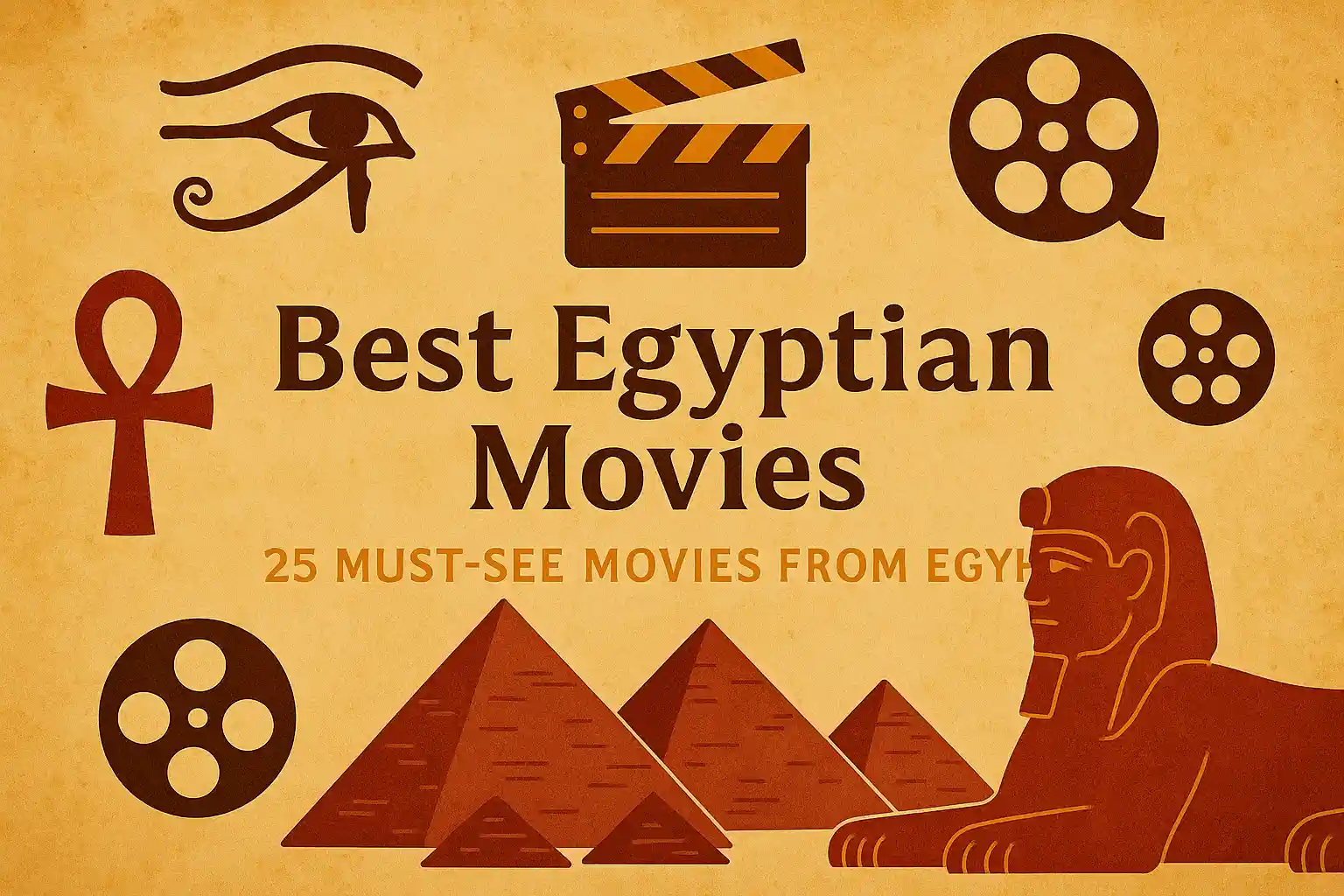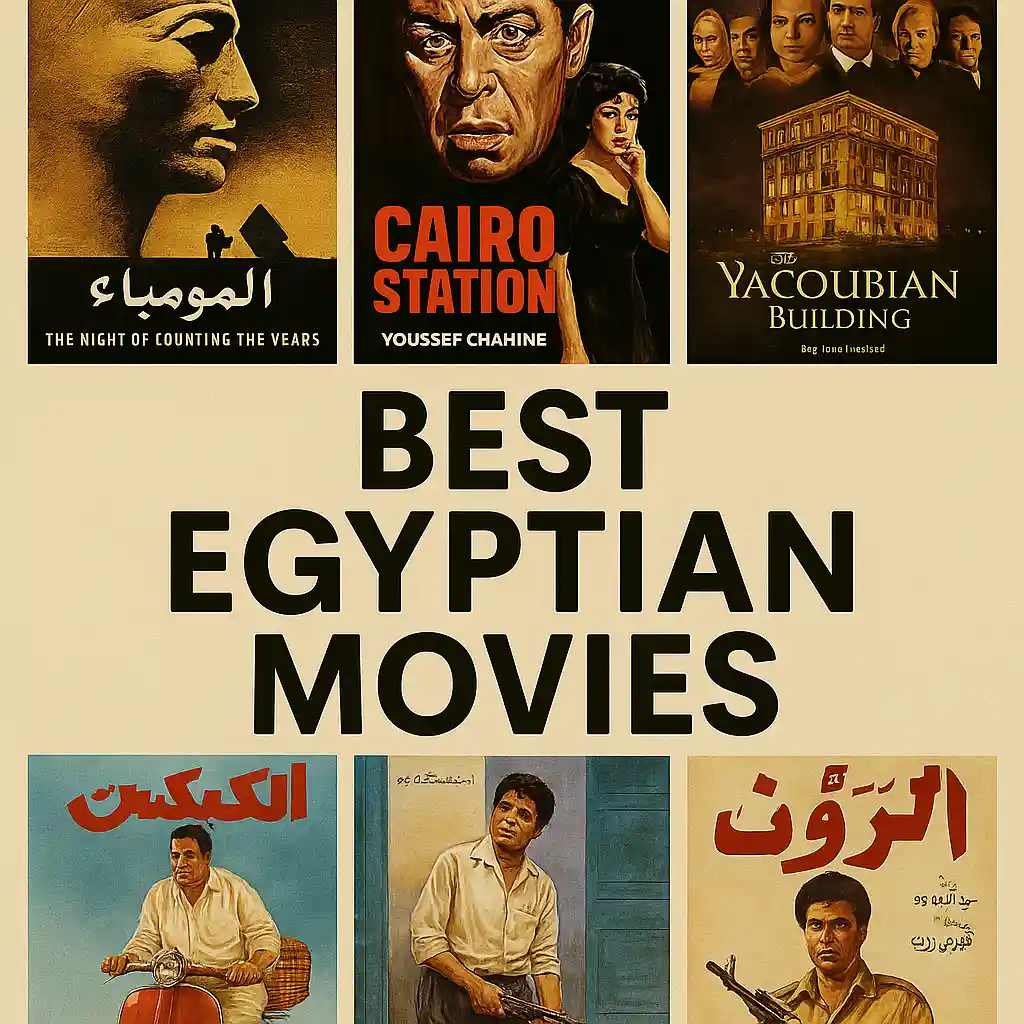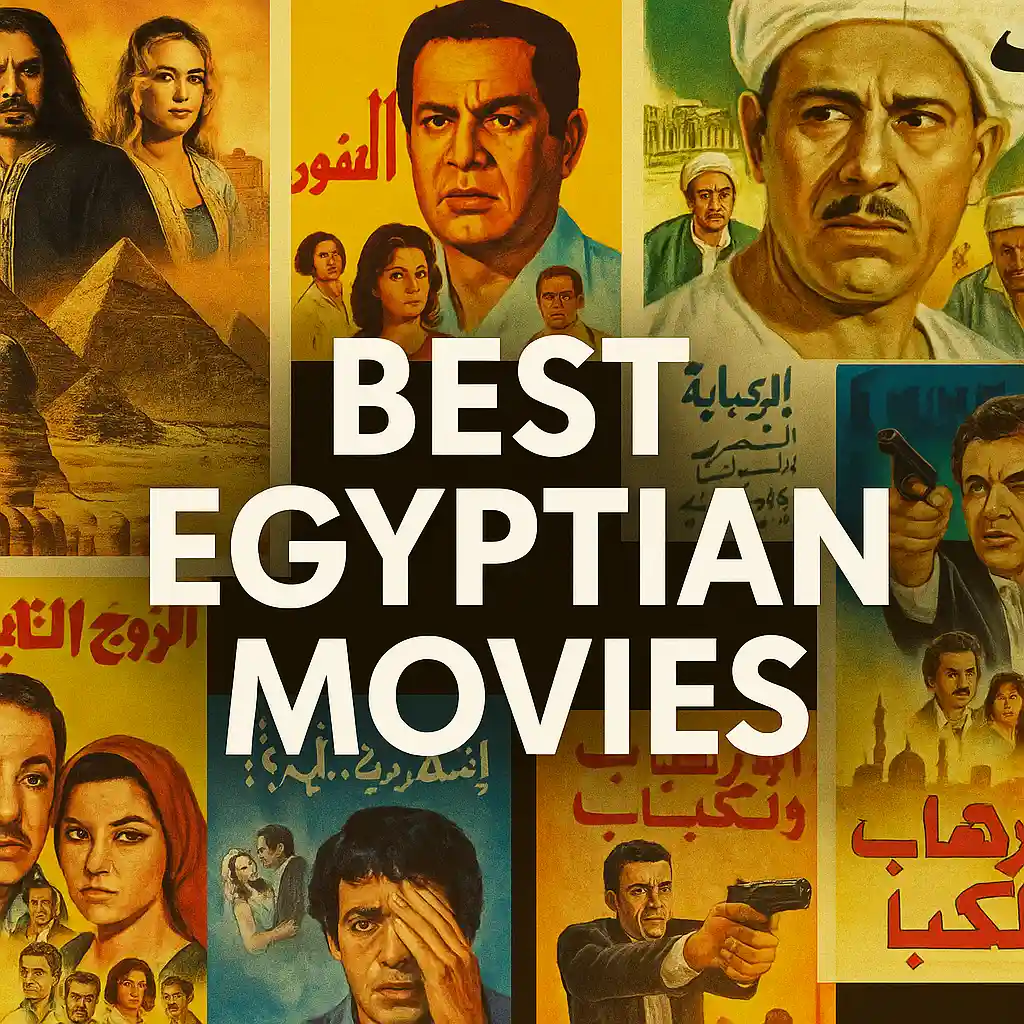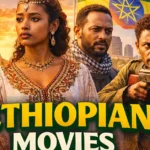
Egypt has long been considered the beating heart of Arab cinema, producing timeless classics and modern masterpieces that resonate both locally and internationally. From the golden age melodramas of the 1940s and 1950s to today’s socially conscious films, Egyptian movies have shaped the cultural identity of the Middle East while reaching audiences around the globe. In this article, we’ll explore 25 of the best films that represent the diversity, artistry, and spirit of Egyptian storytelling. Whether you are a cinephile or just curious about movies from Egypt, this list will guide you through decades of cinematic brilliance.
25. The Nightingale’s Prayer (1959)
- Runtime: 125 min
- Starring: Faten Hamama, Ahmed Mazhar
- Director: Henry Barakat
- Genre: Drama
- IMDb Rating: 7.9
Henry Barakat’s adaptation of Taha Hussein’s novel is a haunting tale of honor, revenge, and resilience in rural Egypt. Faten Hamama delivers one of her most memorable performances as a young woman caught in the grip of societal expectations and personal tragedy. With its lush cinematography and heartbreaking narrative, this film is often cited as one of the finest Egyptian movies from the mid-20th century. Its themes remain powerful, offering viewers a window into the complexity of village life and the struggles faced by women in a patriarchal society. The film deftly balances personal anguish with broader cultural critique, creating a work that still feels immediate. Its tightly woven narrative and evocative score deepen the emotional resonance, ensuring its place in the regional canon.
24. Destiny (1997)
- Runtime: 135 min
- Starring: Nour El-Sherif, Laila Eloui
- Director: Youssef Chahine
- Genre: Historical Drama
- IMDb Rating: 7.2
“Destiny” is Youssef Chahine’s bold portrayal of the medieval philosopher Averroes (Ibn Rushd) and his defense of free thought against rising fanaticism. The film, brimming with passion and theatrical energy, explores the clash between intellectual freedom and authoritarianism. With dazzling production design and Chahine’s signature fusion of music, drama, and politics, “Destiny” is a landmark in modern movies from Egypt, celebrated at Cannes for its universal message about tolerance and the pursuit of knowledge. Its layered characters complicate the usual binaries of hero and villain, while the musical interludes invite audiences into a world where ideas and emotions collide. The film’s urgency remains striking, inviting contemporary reflection on pluralism and debate.
23. The Land (1969)
- Runtime: 130 min
- Starring: Mahmoud El-Meliguy, Ezzat El Alaili
- Director: Youssef Chahine
- Genre: Drama
- IMDb Rating: 8.1
A cinematic ode to the Egyptian peasantry, “The Land” captures the collective struggle of villagers against oppressive landlords. Youssef Chahine’s poetic yet raw storytelling turns the film into a passionate cry for justice. The ensemble cast delivers unforgettable performances, grounding the narrative in emotional truth. Considered a cornerstone of Egyptian cinema, it’s a film that transcends time, resonating with audiences who recognize the universal fight for dignity and land. The visual language—wide fields, dust, and sweat—becomes a character in its own right, underscoring the stakes of survival. Its ending, both tragic and cathartic, still echoes in regional film discourse.
22. The Sparrow (1972)
- Runtime: 110 min
- Starring: Salah Kabil, Mohsena Tawfik
- Director: Youssef Chahine
- Genre: Political Drama
- IMDb Rating: 7.4
Set against the backdrop of the 1967 Six-Day War, “The Sparrow” examines corruption and political dysfunction that contributed to Egypt’s defeat. Youssef Chahine crafts a complex narrative intertwining personal stories with the nation’s trauma, creating a layered commentary on leadership and responsibility. Controversial upon release, it has since gained recognition as one of the most daring Egyptian movies of its era, showcasing cinema’s ability to confront painful truths. Its fragmented structure mirrors the disillusionment of a generation, while the performances maintain intimacy and urgency. The film’s courage lies in its willingness to ask difficult questions without tidy answers.
21. Cairo Station (1958)
- Runtime: 77 min
- Starring: Youssef Chahine, Hind Rostom, Farid Shawqi
- Director: Youssef Chahine
- Genre: Crime Drama
- IMDb Rating: 7.5
A gritty tale set in Cairo’s bustling train station, this film marked a turning point for Egyptian cinema. Youssef Chahine not only directed but also starred as a marginalized newspaper vendor obsessed with a beautiful lemonade seller, played by Hind Rostom. Blending social realism with psychological drama, “Cairo Station” shocked audiences with its intensity and themes of alienation. Today, it is hailed as one of the most important movies from Egypt, foreshadowing the rise of modernist Arab cinema. Its tight runtime amplifies the claustrophobia of station life, while Rostom’s star power adds a magnetic counterpoint to Chahine’s vulnerability.
Egyptian movies
20. The Yacoubian Building (2006)
- Runtime: 161 min
- Starring: Adel Imam, Nour El Sherif, Yousra
- Director: Marwan Hamed
- Genre: Drama
- IMDb Rating: 7.1
Adapted from Alaa Al Aswany’s bestselling novel, this ensemble drama explores corruption, sexuality, extremism, and class struggle in contemporary Cairo. With its sprawling cast of characters, the film paints a vivid portrait of Egyptian society at a crossroads. Adel Imam delivers a career-defining performance, while director Marwan Hamed balances personal narratives with political critique. One of the most widely discussed movies from Egypt in recent years, it reached global audiences and opened conversations long considered taboo in mainstream Arab cinema. Its interwoven stories offer a prismatic look at aspiration, disillusionment, and survival in a megacity.
19. Al-Karnak (1975)
- Runtime: 145 min
- Starring: Soad Hosny, Nour El Sherif
- Director: Ali Badrakhan
- Genre: Political Drama
- IMDb Rating: 7.6
“Al-Karnak” is a harrowing examination of political repression in Egypt during the 1960s. Based on a novel by Nobel laureate Naguib Mahfouz, the film follows a group of young students who fall victim to arbitrary arrests, torture, and betrayal. With Soad Hosny in one of her most powerful roles, the film highlights the destructive consequences of authoritarianism. It was a daring project for its time and remains one of the most important Egyptian movies to capture the anxieties of a turbulent era. The moral ambiguity of its characters deepens the tragedy, making its critique both intimate and systemic.
18. Mama America (1991)
- Runtime: 100 min
- Starring: Yousra, Hussein Fahmy
- Director: Salah Abu Seif
- Genre: Comedy-Drama
- IMDb Rating: 7.0
“Mama America” uses sharp humor to explore the contradictions of modern Egyptian life, juxtaposing tradition and modernization. Salah Abu Seif, often called the father of Egyptian realism, crafts a lighthearted yet poignant narrative about the challenges of cultural transformation. With charismatic performances by Yousra and Hussein Fahmy, the film offers a bittersweet reflection on identity and societal change, making it one of the most beloved movies from Egypt in the late 20th century. Its tonal agility—moving between satire and sincerity—keeps it emotionally accessible and culturally incisive.
17. Sleepless (1957)
- Runtime: 120 min
- Starring: Faten Hamama, Yehia Chahine
- Director: Salah Abu Seif
- Genre: Melodrama
- IMDb Rating: 7.8
An adaptation of Ihsan Abdel Quddous’s novel, “Sleepless” tells the story of a young woman consumed by jealousy and obsession, leading to tragic consequences. Faten Hamama’s performance is both vulnerable and magnetic, capturing the psychological turmoil of her character. Salah Abu Seif’s masterful direction ensures the melodrama never loses its emotional depth. A staple of classic Egyptian movies, it reflects the glamour and tragedy that defined the golden age of Cairo’s cinema. The film’s lush production design and memorable score underscore its emotional stakes, elevating personal drama into operatic grandeur.

16. Days of Sadat (2001)
- Runtime: 165 min
- Starring: Ahmed Zaki, Mona Zaki
- Director: Mohamed Khan
- Genre: Biographical Drama
- IMDb Rating: 7.3
“Days of Sadat” chronicles the life of Egyptian president Anwar Sadat, with Ahmed Zaki delivering a legendary performance that embodies the charisma and complexity of the leader. The film covers his rise to power, political challenges, and ultimate assassination. Mohamed Khan blends intimate character study with historical narrative, making it both a political epic and a deeply human portrait. Among movies from Egypt, it stands out for its ambition and scale, as well as Zaki’s unforgettable presence. The film also meditates on leadership, legacy, and the fragile calculus of peace.
15. Alexandria… Why? (1979)
- Runtime: 133 min
- Starring: Naglaa Fathy, Ahmed Zaki
- Director: Youssef Chahine
- Genre: Autobiographical Drama
- IMDb Rating: 7.7
The first in Youssef Chahine’s autobiographical “Alexandria Quartet,” this film reflects on his youth during World War II, growing up in a cosmopolitan city filled with dreams and contradictions. Blending personal memories with political commentary, “Alexandria… Why?” is both intimate and expansive. Internationally acclaimed, it won a Silver Bear at the Berlin Film Festival, and is still regarded as one of the greatest Egyptian movies about identity and belonging. Its cinephile spirit—movie theaters, rehearsals, and fantasies—turns memory into a lively stage where history and art converse.
14. The Mummy (1969)
- Runtime: 103 min
- Starring: Ahmed Marei, Nadia Lutfi
- Director: Shadi Abdel Salam
- Genre: Historical Drama
- IMDb Rating: 8.0
Also known as “Al-Mummia,” this masterpiece tells the story of an Upper Egyptian tribe involved in the illegal trade of mummies. With breathtaking cinematography and a haunting atmosphere, Shadi Abdel Salam crafts a film that feels both timeless and poetic. “The Mummy” is often hailed as the most artistically accomplished movie from Egypt, preserving cultural memory while questioning moral decay. Its minimalist dialogue and sculptural framing create a trance-like meditation on heritage, guilt, and responsibility.
13. The Emigrant (1994)
- Runtime: 120 min
- Starring: Khaled El Nabawy, Youssra
- Director: Youssef Chahine
- Genre: Historical Epic
- IMDb Rating: 7.5
Chahine’s retelling of the biblical story of Joseph caused controversy upon release but remains one of his boldest works. “The Emigrant” combines spirituality, drama, and visual grandeur, tackling themes of exile, family, and destiny. With Khaled El Nabawy’s strong performance and Youssra’s elegance, the film elevates religious narrative into universal human experience. It stands among the most ambitious Egyptian movies, blending heritage with cinematic spectacle. The film’s color palette and costuming render the ancient world palpable yet contemporary.
12. The Bus Driver (1982)
- Runtime: 110 min
- Starring: Nour El Sherif, Mervat Amin
- Director: Atef El-Tayeb
- Genre: Social Drama
- IMDb Rating: 7.6
Atef El-Tayeb’s “The Bus Driver” is a gritty and realistic exploration of everyday Egyptian struggles. It follows a working-class man who faces exploitation and systemic injustice while trying to support his family. Nour El Sherif delivers a stirring performance, capturing both resilience and despair. The film resonates deeply with audiences for its honesty, making it a cornerstone of socially conscious movies from Egypt. Its street-level perspective and unvarnished dialogue give it documentary-like immediacy.
11. Terrorism and Kebab (1992)
- Runtime: 105 min
- Starring: Adel Imam, Yousra
- Director: Sherif Arafa
- Genre: Political Comedy
- IMDb Rating: 7.4
This satirical comedy takes place in Cairo’s administrative offices, where a frustrated citizen (Adel Imam) inadvertently becomes a “terrorist” while protesting bureaucratic corruption. With sharp wit and biting humor, Sherif Arafa exposes inefficiency and hypocrisy within government institutions. “Terrorism and Kebab” is one of the most iconic Egyptian movies of the 1990s, balancing entertainment with sharp social critique, and remains immensely popular with audiences. Its memorable lines and set pieces have entered the cultural lexicon.
movies from Egypt
10. The Flirtation of Girls (1949)
- Runtime: 125 min
- Starring: Naguib El Rihani, Laila Mourad
- Director: Anwar Wagdi
- Genre: Musical Comedy
- IMDb Rating: 7.9
A classic of Egypt’s golden age, this charming musical comedy stars the legendary comedian Naguib El Rihani in his final screen role. The film blends romance, humor, and unforgettable songs by Mohamed Abdel Wahab. Its enduring appeal lies in its lightheartedness and timeless performances. As one of the earliest popular movies from Egypt, it reflects the joyful spirit of mid-century Cairo and continues to delight audiences. The chemistry between the leads and its melodic numbers ensure cross-generational appeal.
9. The Second Wife (1967)
- Runtime: 115 min
- Starring: Soad Hosny, Shukry Sarhan
- Director: Salah Abu Seif
- Genre: Drama
- IMDb Rating: 7.8
This powerful drama portrays the struggles of a peasant woman forced into a second marriage with the village mayor. Soad Hosny delivers a heartbreaking performance, embodying resilience and tragedy. Salah Abu Seif masterfully critiques feudal power structures while maintaining emotional intimacy. “The Second Wife” is celebrated as one of the best Egyptian movies for its emotional depth and political resonance. It’s a piercing look at coercion, consent, and community complicity.

8. Kit Kat (1991)
- Runtime: 110 min
- Starring: Mahmoud Abdel Aziz
- Director: Daoud Abdel Sayed
- Genre: Drama
- IMDb Rating: 8.1
“Kit Kat” tells the story of a blind man who refuses to be defined by his disability. Mahmoud Abdel Aziz gives an unforgettable performance that balances humor, defiance, and vulnerability. Daoud Abdel Sayed’s film is both poetic and grounded in reality, blending social commentary with touching character study. It’s widely regarded as one of the most profound movies from Egypt, highlighting the triumph of human spirit over adversity. Its neighborhood setting becomes a vibrant microcosm of hopes and hardships.
7. The Iron Woman (1959)
- Runtime: 122 min
- Starring: Faten Hamama, Ahmed Mazhar
- Director: Youssef Chahine
- Genre: Drama
- IMDb Rating: 7.5
A poignant exploration of female strength, “The Iron Woman” follows a widow who defies tradition to raise her children and protect her land. Faten Hamama shines in one of her most inspiring roles, portraying dignity and determination. Youssef Chahine’s direction elevates the film into a socially relevant piece, challenging stereotypes of women in Arab society. As one of the pioneering feminist Egyptian movies, it remains deeply influential. Its nuanced framing of motherhood and authority broadens its relevance beyond its period setting.
6. Al-Asfour (The Bird) (1972)
- Runtime: 112 min
- Starring: Salah Kabil, Mohsena Tawfik
- Director: Youssef Chahine
- Genre: Political Drama
- IMDb Rating: 7.4
One of Chahine’s most political films, “Al-Asfour” reflects on the disillusionment and anger after the 1967 defeat. Through symbolic storytelling, it critiques corruption and national identity crisis. Though controversial, the film resonates for its courage in confronting uncomfortable truths. Among the greatest movies from Egypt, it reflects cinema’s power to mirror collective pain and resilience. The film’s imagery—birds, ruins, and crowds—speaks a visual language of loss and renewal.
5. Bab el Hadid (Cairo Station) (1958)
- Runtime: 77 min
- Starring: Youssef Chahine, Hind Rostom
- Director: Youssef Chahine
- Genre: Crime Drama
- IMDb Rating: 7.6
This film reappears here not by mistake, but because of its double impact: both as a turning point in Chahine’s career and as a revolutionary step in Arab cinema. With its stark realism and psychological complexity, it remains one of the most daring Egyptian movies ever made, symbolizing Cairo as both a bustling city and a place of loneliness. The film’s audacious character study and narrative compression still feel modern.
4. An Egyptian Story (1982)
- Runtime: 115 min
- Starring: Nour El Sherif, Youssra
- Director: Youssef Chahine
- Genre: Autobiographical Drama
- IMDb Rating: 7.6
Blending autobiography with surrealism, “An Egyptian Story” reflects on Chahine’s own career and health struggles. With bold narrative experimentation, the film confronts identity, sexuality, and creativity. Its honesty and artistic daring make it one of the most significant movies from Egypt, appreciated by cinephiles worldwide. The interplay between memory and performance invites viewers to consider cinema as self-portrait.
3. The Innocent (1986)
- Runtime: 135 min
- Starring: Ahmed Zaki, Mahmoud Abdel Aziz
- Director: Atef El-Tayeb
- Genre: Political Drama
- IMDb Rating: 8.3
Banned for years due to its controversial ending, “The Innocent” follows a naïve soldier who becomes complicit in systemic brutality. Ahmed Zaki’s performance is legendary, embodying both innocence and despair. With themes of state oppression and morality, it stands among the boldest Egyptian movies, challenging viewers to question authority and conscience. Its restored versions have renewed debate on censorship, responsibility, and truth.
2. The Terrorist (1994)
- Runtime: 120 min
- Starring: Adel Imam, Sherine
- Director: Nader Galal
- Genre: Drama
- IMDb Rating: 7.2
This film tackles extremism head-on, with Adel Imam portraying a militant whose worldview changes when he hides among ordinary Egyptian families. The film balances tension, humanity, and humor, delivering a strong anti-extremist message. It became a massive box-office success and remains one of the most popular movies from Egypt, praised for its courage and accessibility. Its empathetic approach humanizes ideological conflict without excusing violence.
1. The Night of Counting the Years (1969)
- Runtime: 102 min
- Starring: Ahmed Marei, Nadia Lutfi
- Director: Shadi Abdel Salam
- Genre: Historical Drama
- IMDb Rating: 8.5
Known internationally as “The Mummy,” this film is widely regarded as the greatest masterpiece in Egyptian cinema. Its meditative pacing, poetic visuals, and exploration of cultural heritage give it timeless resonance. The story of a tribe torn between loyalty and greed for ancient artifacts becomes a metaphor for national identity and moral responsibility. Universally praised, it remains the crown jewel of Egyptian movies and a touchstone of world cinema. The restoration efforts have cemented its place in global archives, preserving a singular vision of history and ethics.
Conclusion: Why Egyptian Cinema Still Matters
From the melodramatic splendor of Faten Hamama’s classics to the politically daring works of Youssef Chahine and the modern realism of Atef El-Tayeb, movies from Egypt embody a wide spectrum of artistry and social commentary. Egyptian cinema continues to inspire audiences across the Arab world and beyond, serving as both a mirror of society and a beacon of cultural pride. To dive even deeper, you can explore analyses from The Guardian’s guide to Arab cinema or read the BBC’s feature on Egyptian film history. These resources highlight why Egyptian cinema remains essential to global film culture.
Frequently Asked Questions about Egyptian movies
Q1: What makes Egyptian movies unique?
Q2: Who are the most famous Egyptian directors?
Q3: Which Egyptian movie is considered the greatest of all time?
Q4: Are modern Egyptian films as influential as the classics?
Q5: Where can international audiences watch movies from Egypt?




